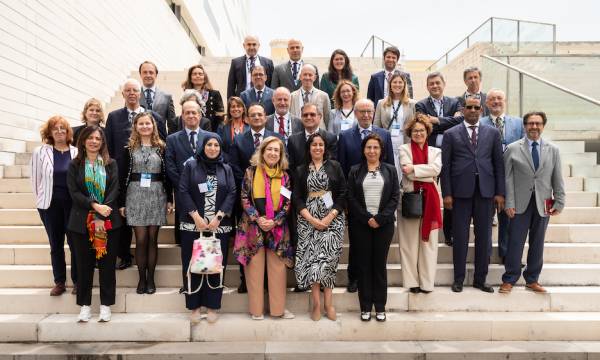“Collaboration between institutions can make all the difference; that’s why it’s important to get everyone around the same table to find similarities and differences and try to understand how we can work together”, highlighted the Rector of NOVA University Lisbon, João Sàágua, about the meeting of the Union for the Mediterranean (UfM) – an intergovernmental institution that brings together the countries of the European Union and 15 countries from the southern and eastern shores of the Mediterranean – which took place all day on Thursday 16th at the NOVA Rectory.
“Our cooperation with this region goes back decades and has expanded with the opening of NOVA Cairo, our international campus in Egypt, in 2022,” said the Rector of NOVA at the kick-off session, noting that it is the only campus of a Portuguese university outside the territory and an important milestone in promoting academic change across borders, creating new opportunities in the region. “It shows the commitment of NOVA to build bridges and bring together students, academics, and staff from Egypt and Portugal and wants to go further”.
In addition to praising academic autonomy “so that the university can fulfill what it has set out to do, which is to be internationally relevant with local and regional impact”, NOVA’s Rector also pointed out that on the table is the enormous challenge of effective management. “Increasingly, we have to look for the best strategies to attract talent and the best partners that will allow us to have the resources we need for our mission”.
João Sáágua also highlighted NOVA’s commitment to gender issues – “it’s been four years since the University approved a Gender Equality Plan and recently created an office to promote these issues” – and “how much cooperation can make a difference, to achieve results together that would never be possible alone: see the example of the National Consortium we created with the Universities of the Algarve and Évora – Campus Sul – which covers more than half of Portugal’s territory. Or EUTOPIA, the alliance of 10 European universities we belong to, with more than 300,000 students and 2,500 academics, spread and connected throughout Europe, and with 6 global partners, including the University of Rabat in Morocco. I am therefore very grateful for your presence and commitment to a meeting that seeks to do more for our region,” he concluded.
The conference, organised by the UfM in partnership with NOVA and the Erasmus+ National Agency, also featured a welcome address by Fernando Alexandre, Minister of Education, Science and Innovation, in the opening session, who recalled the role of the Mediterranean countries in the history of humanity. “The Mediterranean has always been a sea of cultures and civilisations; its history shows a continuous exchange of knowledge, and the university is one of its creations. Today we know that it is a region of enormous inequalities, and faces a series of social, environmental, and economic challenges. Therefore, we also believe that higher education institutions have a vital role and an enormous responsibility to solve these challenges”.
In addition to pointing out that they must be “places of diversity, inclusion and freedom”, and that governments must guarantee their autonomy so that they can fulfill their mission, Fernando Alexandre also stressed that the Portuguese government is also very committed to cooperation between higher education institutions in the Mediterranean. “And we believe that meetings like this can encourage the way forward, as examples of what we can do to improve the lives of people in this region.”
Filip Van Depoele, Head of the European Commission’s International Cooperation Unit, then reinforced the Commission’s commitment and continued support to the countries of the South in creating better opportunities in higher education.
“The European Commission strongly supports the countries of the South and considers it essential that we continue to work together to ensure that everyone is involved and focused on the same goal. We are deeply grateful to the Union for the Mediterranean for its tireless work and commitment in bringing all parties together around this common cause,” stressed Depoele.
The launch was also marked by statements from Mamoun Al-Debi’e, Advisor to the Secretary General of the UFM, who shared Jordan’s experience in the autonomy of academic institutions and in creating programmes to promote gender equality. “Good governance requires the cooperation of all”.
Itaf Ben Abdallah, advisor for higher education and research at the UfM, also noted the commitment of Portuguese universities in this area. “Governance, internationalization, equality, inclusion, and cooperation are values that we all share and that are on the table”.

